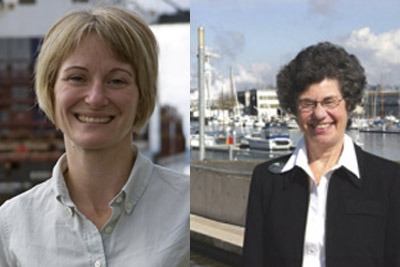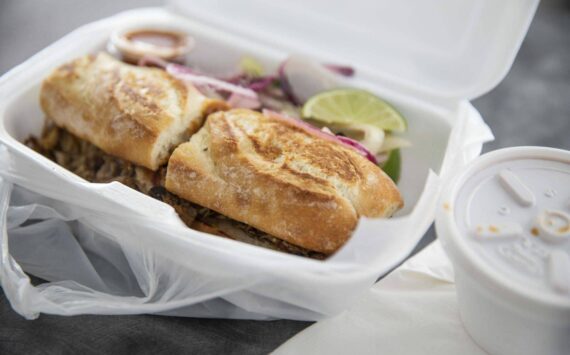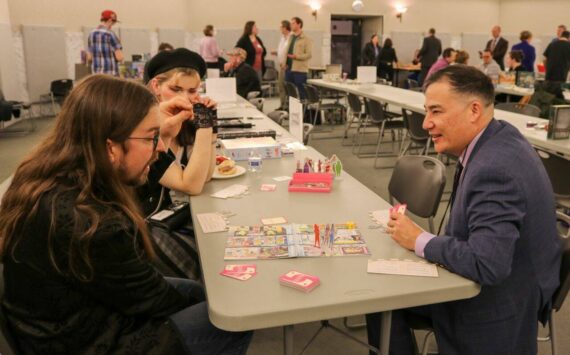The Port of Tacoma has selected Karen Matthias, of Matthias Consulting, as its new Alaska consultant. Matthias has worked in Alaska’s business, economic and political arenas for seven years, and as Consul at the Consulate of Canada in Anchorage from 2004 to 2009. Matthias established Canada’s first presence in Alaska. She also worked for 10 years with the Canadian Department of Foreign Affairs and International Trade.
“We are very pleased to have Karen on our team,” said Port of Tacoma CEO John Wolfe. “Her skills, experience and network of contacts will benefit our Port and our community by continuing to develop our relationships with the Alaska business community.”
Alaska is the Port of Tacoma’s third largest trading partner, accounting for more than $3 billion in trade each year. Two major shipping lines, Horizon Lines and Totem Ocean Trailer Express (TOTE), Inc., both serve Alaska from Tacoma. A number of other Alaska-related companies, including Carlile, Lynden, The North West Company, the Odom Corporation and Trident, all have facilities at or near the Port of Tacoma.
Recognizing the significance of Alaska business and trade, the Port first hired an Alaska consultant in 1986. Shari Gross Teeple served as the Port’s Alaska consultant for the past 25 years. “Shari did a tremendous job for our Port and our community,” said Tong Zhu, the Port’s Managing Director, Commercial Group. “We are confident that Karen will continue to build on the excellent work that Shari has done for us.”
Gross will work with Matthias and the Port briefly to ensure a smooth transition.
Matthias will remain based in Anchorage, where she has lived since 2004, where she is involved with the Alaska State Chamber, Resource Development Council and other business groups involved in the state’s economic drivers and its potential large-scale resource development projects. She has also worked with Horizon Lines and TOTE representatives on the board of the Alaska State Chamber of Commerce.
– – – – – – – – – – – – – – – – – – – –
Port of Tacoma’s Alaska Connection (03/16/06)
By Todd Matthews, Editor
For more than 20 years, Shari Gross Teeple has been the point person for the Port of Tacoma in its relations with Alaska. A former Alaska resident and organizer, she keeps the port up to speed on Alaska-related legislation, employment, politics and leadership, and key issues as they relate to the port. Teeple is on the Board of Directors for the Alaska State Chamber of Commerce, representing the Tacoma-Pierce County Chamber of Commerce. She also co-chaired last year’s widely-acclaimed report Ties That Bind: The Enduring Economic Impact of Alaska on the Puget Sound Region.
“Shari has been our eyes and ears on the ground for Alaska,” says Ed Engelhardt, director of the port’s container terminal businesses. “She knows the political lay of the land extremely well, and deals very well with our major carriers in the Alaska market. She’s done a wonderful job.”
I recently met Teeple to discuss her career and Tacoma’s economic connection to Alaska.
TACOMA DAILY INDEX: How did your connection to Alaska begin?
SHARI GROSS TEEPLE: I moved from Alaska to this area 22 years ago. Alaska was what I had known best. It’s what I understood the best. I was involved in a lot of statewide matters, as well as international trade issues. I ran Alaska’s European trade office before I came down here. I started connecting with Alaska’s connected people in Puget Sound, trying to figure out what I wanted to do. It was just when then-Sealand announced that it was going to be moving down to the port, and Tote was already at the port, and someone suggested I go talk to the port. They said, ‘Oh, we are going to need someone, but right now we’re under construction building the terminal for SeaLand.’ A few years later, they completed construction and they brought me onboard. So I’ve been representing the port since 1986.
INDEX: What is the work you do for the port?
TEEPLE: Basically, I am the port’s point person for Alaska. Over 25 percent of the port’s business is Alaska-related. The port is interested in whatever is happening in Alaska because it knows that what is good for the economy up there is going to be good for it down here. Certainly, there is an impact down here on whatever goes on up there. My job is to keep the port informed about what the issues are up there, and what impact they might have down the road, or immediately, on port operations. I make recommendations on how the port might prepare for those. Because Alaska is kind of a small town, that means working with the community, working with elected officials, in the cities as well as the states.
INDEX: What are some of the big issues right now?
TEEPLE: The big issue is the gas line. In the long-run, that would have the biggest impact on Alaska’s economy. In the short-term, construction of a pipeline would be important to the Port of Tacoma and Alaska. Lots of construction jobs. Lots of materials going through the port. Lots of shipping. A lot of business. In the long-term, the gas line means cheaper power for Alaska. Eventually, they’ll be able to tap off that gas and bring it into some of the bush communities. Down the road, it would be a big impetus for developing a lot of Alaska’s resource. With the gas line, the hope is that it will open up opportunities that just aren’t there right now.
INDEX: Describe the gas pipeline.
TEEPLE: It would come down from Prudhoe Bay, [then] south into the Yukon Territory, and then go east and catch up with the markets for Midwest gas in the United States. That’s the main project they’re talking about. First it was $15 billion. Then it became $20 billion. Now, who knows? In reality, it will be way more than that. It’s the biggest project ever in North America. It’s enormous. If you look at the amount of steel that would have to go into it, and all of the logistics, it is the biggest project ever. That’s the project Governor Murkowski is pushing right now.
INDEX: What impact would this have on the port?
TEEPLE: When the oil pipeline was built, the logistics were completely different. Tacoma got a lot more going through its boundary relative to the whole process than it probably would with the gas pipeline because the gas pipeline will stretch across Canada. There will be different ports used, railroads used, trucks used. Tacoma will get a huge amount of business, but they won’t get proportionately as much as they did [with the oil pipeline] just because of the length of the pipeline, the route of the line, and maybe other ports being more accessible. For example, I can imagine that Skagway might be a port that actually will receive some cargo. Whitehorse is right over there. Rail is right over there. There are roads and a highway right over there. That’s not far from the gas right-of-way.
INDEX: Backing up a bit, were you born and raised in Alaska?
TEEPLE: No. I was born and raised in Detroit. I moved to Alaska right after statehood, and lived in Juneau for 22 years. For the first few years, I was having children. I was a community activist. I organized the League of Women Voters in Alaska. I organized chapters statewide as well — Juneau, Kodiak, Anchorage, Fairbanks, Kenai, and Ketchikan. I lobbied for them and other organizations for a number of years. And then I headed up United Fishermen’s of Alaska, which is the statewide trade association for commercial fishermen. And then the state opened a European Trade office, and I was appointed by Governor Hammond at the time to head up that office.
INDEX: When you look back on working with the Port of Tacoma, what are some of the things that stand out for you?
TEEPLE: I have to say, top of the list, has been the port’s enthusiasm for Alaska. They have been so aware of the importance that market is for them. One of the challenges has been to enlighten the rest of Washington, which is already enlightened about foreign trade. Often times, people at large don’t appreciate that Alaska connection. It’s not quite as sexy as foreign trade. A challenge has been to kind of look at it in a way as foreign trade, and see how much our trade actually is up there. It’s quite substantial. That’s where Ties That Bind comes in. Twenty years ago, we did the first study. We’ve done three different editions, and I’ve chaired the last two with Renata Bennett from Totem Ocean Trailer Express. The idea there was to document for [people] here — it wasn’t intended for Alaskans at all — it was intended to say to Washington public opinion makers, ‘Alaska is important. This is where the jobs are. This is how many dollars’ — to quantify the value of Alaska. It’s been a useful document. We present it to people here in Washington as much as we can.
INDEX: How often do you travel to Alaska?
TEEPLE: Well, for one reason or another, not always for the Port of Tacoma, at least once a month. It depends what’s going on. If it’s in the winter, I’m more apt to go to Juneau when the legislators are in session.
INDEX: What has been your impression of the port’s recent growth?
TEEPLE: I think they’re just dynamic. The fact that they are lean and mean is a big asset for them. They’re not as much of a bureaucracy as a lot of other public entities. I don’t have to go through layers of bureaucracy. Their strength has been their people, and that held true with Alaska. They are very enthusiastic about their customers, wherever they are. They are customer-oriented. They do what they can to please their customers, and that means maintaining a certain enthusiasm and hands-on involvement for their customers, so they really understand their operations and know what those customers need. People in Alaska appreciate the port and the fact that the port does recognize Alaska’s importance.
INDEX: What do you enjoy most about your work?
TEEPLE: I don’t have to sit at a desk [laughing]. I get to travel to Alaska. I get to do what I enjoy doing anyway. I get to still maintain all my contacts up in Alaska that I’ve worked with all those years.





